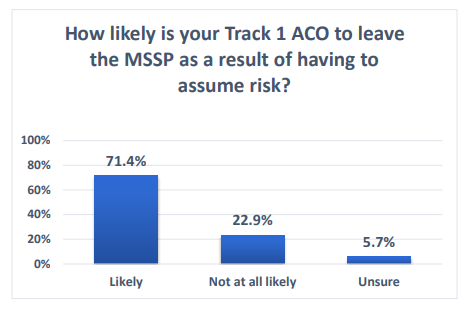|
PRESS RELEASE WASHINGTON, D.C., May 2, 2018 Today, the National Association of ACOs (NAACOS) released results from a survey about assuming risk and future participation plans for Medicare Shared Savings Program (MSSP) Track 1 ACOs. The web-based survey was conducted in April 2018 and survey links were emailed to Track 1 ACOs entering their third agreement periods in 2019. NAACOS specifically reached out to the 82 ACOs that began the MSSP in 2012 or 2013 and remain in Track 1 in 2018, thus they are required to move to a two-sided ACO model in their third agreement period beginning in 2019. The goal of the survey was to better understand what ACOs are planning in the face of these requirements and how they feel about risk. While we are pleased that 43 percent of these Track 1 ACOs responded to the survey, we are troubled by the results which illustrate NAACOS’s long-standing concerns about forcing ACOs into risk-based contracts. As seen in the graph below, results from a key survey question show that 71 percent[1] of ACO respondents indicated they are likely to leave the MSSP as a result of having to assume risk.
NAACOS encourages ACOs to prepare to move to risk and strongly supports ACOs that are ready to do so, but we do not support forcing ACOs to assume risk if they are not ready. Clif Gaus, President and CEO of NAACOS, comments on the survey results, “These results paint a bleak future of what will happen if the government keeps its mandate to push ACOs into risk. It’s naïve to think ACOs that aren’t ready will be forced into risk in what is ultimately a voluntary program. The more likely outcome will be that many ACOs quit the program, divest their care coordination resources and return to payment models that emphasize volume over value. This would be a real setback for Medicare payment reform efforts.” While this survey focuses on a select group of ACOs facing risk requirements for 2019, forcing ACOs into risk will become an annual issue as more ACOs move through their second agreement periods. It would be devastating to see ACOs quit the program year over year as a result of risk requirements, especially considering the progress we are starting to see from ACOs. For example, MSSP ACOs that earned shared savings in 2016 had a significant decline in inpatient hospital expenditures and utilization as well as decreased home health, Skilled Nursing Facility, and imaging expenditures. MSSP ACOs subject to pay-for-performance quality measures earned an average quality score of 95 percent in 2016. Additionally, ACOs participating over a longer period of time show greater improvement in financial performance. For example, 42 percent of MSSP ACOs that started the program in 2012 earned savings in Performance Year 2016 versus 18 percent of those that began in 2016. Finally, research shows that ACOs are reducing costs relative to their peers in strictly fee-for-service payment. Results such as these are promising especially given the steep learning curve early ACOs faced, the magnitude of the clinical and operational transformations they are undertaking, and the challenges of dealing with evolving program requirements. It’s important to note that ACOs have a number of valid reasons for not being ready to assume risk. The survey asked ACOs what they view as their top challenges/barriers to assuming risk. Almost 40 percent of respondents selected the following answers as the top challenges:
The vast majority (more than 80 percent) of Medicare ACOs remain in MSSP Track 1, which is largely a result of the challenges listed above, among others. Another top challenge, selected by 36 percent of respondents, was “concerns about past performance.” Gaus comments, “The challenges to assuming risk are not surprising and highlight that CMS needs to face the reality about how the majority of ACOs view risk. ACOs need to gain confidence through successful performance in a one-sided model in order to be prepared to assume risk. Given challenging program rules and benchmarks, achieving shared savings remains a hurdle for many, which is why we advocate for program and benchmarking changes. We also need to see more realistic levels of risk, provide greater predictability of rules and allow more reliable financial projections – ideally through greater use of prospective benchmarks which provide an upfront spending target for ACOs.” The survey also asked ACOs if they were given an opportunity to continue in Track 1 for a third agreement period, how likely they would be to continue participating in Track 1. Seventy-six percent of respondents said they would be “completely likely” or “very likely,” illustrating how incredibly beneficial this policy change would be. NAACOS has repeatedly advocated for CMS to allow ACOs that meet certain criteria related to lowering costs or improving quality or achieving high quality, as detailed in this recent letter to the agency, to be eligible to continue for a third agreement in Track 1. The results from our recent survey show that many ACOs would benefit from this opportunity and would stay in the program. Gaus responds, “Transforming care delivery and achieving successful payment reform is a long road. Let’s keep ACOs on the right path by allowing those that demonstrate results in cost and/or quality to remain in a one-sided model for at least one more contract term. At the same time, we need to fix program rules to enable ACO success and provide new opportunities to attract ACOs into two-sided models. These will remain at the top of NAACOS’s advocacy agenda.” |

